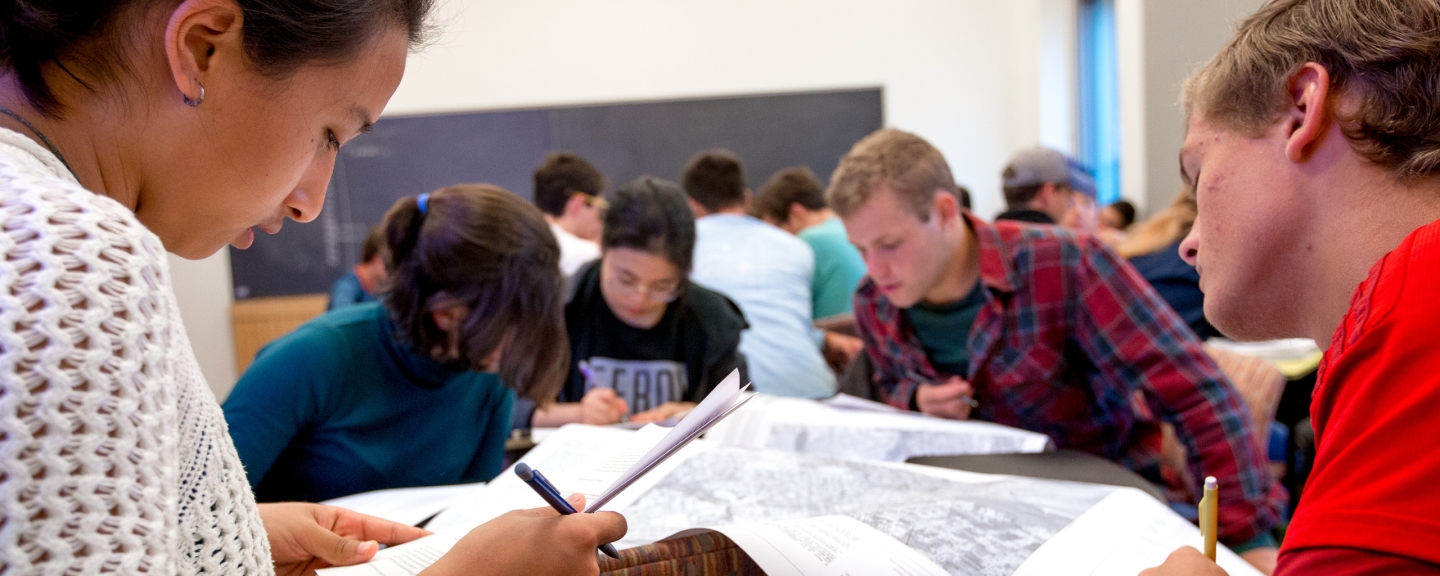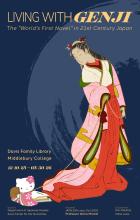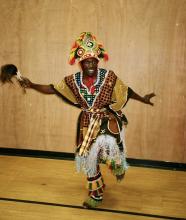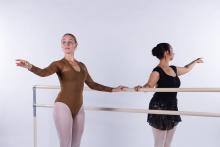
Experiential Learning
Leadership, creative thought, and intellectual risk taking

With a curriculum anchored in the liberal arts and sciences and an approach to learning responsive to an evolving, increasingly complex world, a Middlebury education is as distinct as it is comprehensive.
We offer a 21st-century global liberal arts and sciences education. Scholarship and research are not confined to the classroom or laboratory, nor even to a particular field of study. A robust offering of majors, minors, and academic programs not only provides students with a diverse range of disciplines to explore and to experience, but each discipline is intended to work in concert with another, fostering an evolution of cross-disciplinary collaboration that is at the heart of the academic experience at Middlebury.
Interested in the humanities and arts? STEM? Learning a language? Do you want to explore an interdisciplinary field like environmental studies? Do you envision a career in the social sciences?
The Middlebury curriculum is broad, deep, and flexible. Once here, you may decide to focus on a new area of study. You can engage in extracurricular pursuits like playing sports, writing for the student newspaper, or performing in a musical, and also participate in cocurricular activities, such as volunteering in the community, through our experiential learning centers, and much more.
Such exploration and immersion is the essence of a liberal arts education. Here you have the time, space, and support to pursue the many interests that appeal to you!
From your first-year seminar to your senior work, you can create an academic experience entirely your own at Middlebury. Explore the subjects you love and discover some new ones you’ve never considered. Now is the time to do it, and Middlebury makes it possible.
Academic advising is central to the undergraduate experience. It’s an ongoing conversation between students and faculty, beginning with your earliest days on campus and lasting over the years as you plan for graduation and life after college. You’ll also find the resources you need in other areas—from tutoring and writing help to planning and time management. The Center for Teaching, Learning, and Research is a wealth of peer and professional support. The Registrar’s Office is also a great source of useful information.
An undergraduate education at Middlebury is an immersive experience with the world—a global education—whether in Vermont or at any of our Middlebury schools and programs.
Middlebury has been offering immersion language learning from beginner to graduate level for more than 100 years. Each summer we welcome students from all walks of life and all parts of the world who want to study one of our 13 languages in an intensive and immersive environment.
Middlebury Language SchoolsThe Middlebury Institute of International Studies in Monterey, California, offers graduate programs that prepare students for professional roles in cross-cultural, multilingual environments. Its career-oriented degrees provide intentional focus on developing skills and implementing practical solutions worldwide.
Middlebury Institute of International StudiesWith 37 schools in 17 countries, students experience total immersion in the language and culture of their choice—an authentic experience at a local academic institution, engagement with the community, and personal discoveries.
Middlebury Schools AbroadCentrally located in Washington, D.C., these offices serve as a place for the entire Middlebury community to gather, learn, and network with experts here in the city, nationally, and internationally. We provide access to academic programming, educational events, and internship opportunities.
Middlebury in DC
Davis Family Library, Upper Level Display Cases
The students in JAPN 290 (“Reading the Tale of Genji” in English”) and Prof. Otilia Milutin (Japanese Studies) are cordially inviting you and your students to view their exhibit, “Living with Genji: The World’s First Novel in 21st Century Japan.” The exhibit features a selection of objects, artwork, movies, and manga inspired by the 11th century classic The Tale of Genji by Murasaki Shikibu. Our exhibit aims to showcase a few selected items that speak both of the tale’s enduring legacy in traditional Japanese arts, and, equally important, of its contemporary reiterations, be they manga and movies adaptations or commercial, consumer-oriented products such as mascots, stationary, fabrics, and other everyday objects. Through our exhibit, we hope to demonstrate how a millennium old classic lives and thrives today in contemporary Japan.
Middlebury College
Open to the Public

A rich taste of African culture
through powerful, vigorous,
high-energy movement
Let the beat of the drum move
your body. Participants will
learn songs, rhythms, dances,
and culture as we embark
on a journey of dances
from the African diaspora.
Class is accompanied by live
musicians to help participants
understand the communication
between the music and the
dance.
Wilson Hall, McCullough Student Center
Open to the Public

A movement primer by Michael Sakamoto
Butoh and American street dance each grew out of conditions of socio-economic crisis in the post-World War II era in Japan and the U.S. With elements inspired by both movement practices, Michael leads exercises to demonstrate a unique blend of intercultural and self-reflexive performance embodiment.
Mahaney Arts Center Dance Theatre
Open to the Public
Free
speaker series
McCardell Bicentennial Hall 104

Tuesday-Beginner/Intermediate
Wednesday-Intermediate/Advanced
Ballet returns to the Dance Department this Fall. Classical Ballet technique in traditional ballet class structure. No pointe shoes, please. PE credit is available for attendance at 8 classes. Previous dance experience in any form is recommended.
Mahaney Arts Center Dance Studio
Closed to the Public